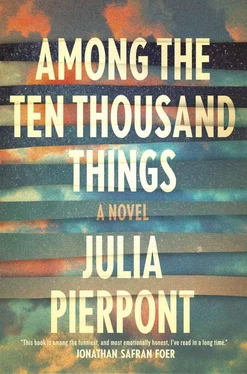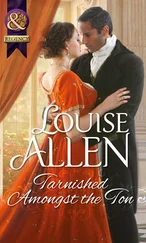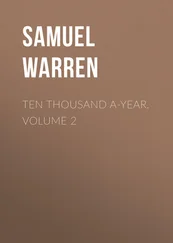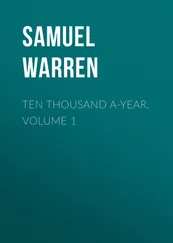—
When the lines were cast there was nothing to do, the rods even rigged to hold themselves up over the water. Gary produced a barrel of pretzels, his fingers wide spinning off the ridged red lid, and they ate gathered around it, backs to the sun, heads huddled against the wind. Crunching into each other’s ears.
Gulls shrilled. Kay searched the sky for them but brought her face down again quickly, to the deck and their passing shadows, swelling and shrinking and sharpening at the edges.
“Baby, you okay?” Deb touched her shoulder. “She gets a little carsick.”
“Yeah.” Simon laughed. “A little. ”
Kay leaned her head against the side of the boat. The water below kept up in little bursts, frothy and fizzing. The boat’s edge was hot in a good, painful way.
—
Kay had forgotten the last thing about fishing — that there would be fish. Mostly they caught bluefish and stripers, too small, that had to be pulled off the hook and thrown back. Then a splash as the fish rejoined the water and Gary cried, “Good as new!” which seemed unlikely.
Simon got the real first catch. Shouted, “Holy crap holy crap!” At the other end of the line, the fish thrashed silver bodied through the air. In the excitement Ayn Rand fell overboard. She bobbed along for a few waves before disappearing under the boat. (“What a shame,” said Deb, faintly smiling.)
Gary collected the fish with a long-handled net, the kind for butterflies or scooping leaves out of pools. “He really hit.” Captive, the fish held very still. Only when he took it in his hand did it come to life again, wanting to wag itself away.
“Yeah!” Simon shouted. “I’m the man !” His face filled with the kind of thrilled alarm Kay had seen on him only during chase scenes and the bloodier parts of movies.
“If he’d of hit any deeper, we’d have been cut off this way,” Gary was saying. Kay folded all the way forward and gripped her sneakers, wishing to close her ears. “Because those teeth are sharp.”
“Sick,” Simon said. “Mom, isn’t that sick?”
“Very impressed.”
Suddenly Kay didn’t like Gary, how he looked cut from stone and how his toothbrush could have touched hers in the bathroom. How her mother looked in his hat. He went on, “Now, this would be a darker meat, which I like, but some people don’t because it’s oilier. Okay, now see where I’ve got him here? I’m just going to reach in there, all right? One, two—”
“Siiiick.”
—
Kay was hooking and unhooking lures from her laces when Simon’s bottom half stepped into view. He flipped the lid to the cooler, pulling out the last of the soda cans two by two and lining them up along the boat floor as Gary planted the fish, white plastic bagged, into the watery ice.
A few minutes later, she heard it. A crinkle. Might have been only the plastic bag settling. Then she heard it again, louder. Crinkle. Crinkle.
For Kay, the day fell mostly away after that. The waves rolled the boat, and the boat rolled the cans, and parts of her rolled too. She had to pee. Simon had had to go earlier, and Gary had shown him where he could do it off the side. “The burden of our sex,” her mother said. Kay hadn’t been around boys peeing before, except maybe when they were small and she didn’t remember. Not like she saw anything, only the way Simon stood with his back to her and didn’t talk while he was going. Then Gary went too, and the sound of his pee stream was louder than her brother’s.
She had to go so bad. The boat lurched. All of her lurched. The plastic bag crinkled. She wondered, because she hadn’t seen, which lure the fish had chosen, feeling it was more her fault if he’d liked her earring. She could hear him, twitching, through the quarter-inch space below the lifted lid.
Nothing of the day would stay with her as much as that cooler and its faint but awful rustling sound. It was the sound she’d hear, the small coffin she’d think of, whenever she saw another of these blue-and-white coolers, packed with ice and glinting soda cans, at picnics, at field hockey, the whole next year at school.
“For what we are about to receive, may the Lord make us truly thankful. God our Father, thank you for your love and favor. Thank you for bringing a member of our family to share with us today.”
In the restaurant, Jack was peeking. Or, no, Jack was plainly watching, his chin not even lowered, his hands folded on the table but not in prayer, not pressed at the palms like his mother’s or Charles’s. Here is the church; here is the steeple. Charles said the words, and they both were holding their eyes closed, not that Jack believed it. Who closes their eyes, really, in the middle of a restaurant — praying, as with kissing, who keeps their eyes really closed? Jack smiled, watching. Go ahead, call me out. Both of you, either of you, pretending not to see.
“Bless our loved ones who are near us and keep safe those that are far away. May we always be mindful of the needs of others, for Jesus’s sake, amen.”
Open the doors, and here are the people. Phyllis and Charles returned to the room, to the middle of the mostly empty Shining Star Tavern where his mother’s chief worldly concern had been getting a table.
The restaurant was Charles’s idea, to save Phyllis from having to unwrap or defrost an extra meal. They took the Lincoln there, his stepfather driving, his mother on her special ass pillow, Jack in back like a little boy.
“This is our son,” Phyllis said on the way in, addressing herself to the hostess, the waitress, the busboy, to everyone but the signed photographs on the walls, George Foreman and Walter Cronkite. The best use of family was having it in front of other people. Jack won them fewer points than a grandchild, and Wade, the seventeen-year-old kid who poured their water, didn’t bear much witness, but it was something.
“They’ve redone the menu,” Phyllis told him when they were seated, flapping her heavy napkin out of its fleur-de-lis fold.
“I don’t doubt it.”
“Redone the prices too.”
His mother got her tonic with a garden salad, lots of pepper and dressing on the side. “And one of your chops,” she said, patting Charles on the hand. “I never eat enough to make it worth ordering my own. Just one of his chops, that’ll do me.”
Jack got the ahi tuna, which came with wasabi molded into the shape of a leaf, outer Houston’s soft stab at the urbane. Charles’s chops turned out to be lamb, with sprigs of rosemary and a porcelain vat of electric-green jelly center plate. Phyllis made a show of choosing the smallest and most well-done piece of meat.
“Falls off the bone. He likes ’em bloody. Don’t you, Charles?”
“Still saying baa.”
“Jackie, I don’t know how you eat that. I just cannot stand the smell of fish.”
“It’s very good, Mother. Good for you too. You should try it.”
“Jack, how’s work?”
“Now, is that going to smell up everything?” his mother asked. “Because we don’t eat fish.”
“You eat shrimp.”
“I do not.”
“Charles’s jambalaya.”
“Tell us about the art world, Jack.”
“That isn’t — that’s not fish. Is it, Charles? Shrimp’s not fish.”
Jack wished he could order a drink, just a beer. Phyllis went through three sodas because what’s that they say, about old habits. She guzzled tonic like it was wine, and wasn’t she fooling herself with everything, not just the drink but the man, with Charles? Who the hell is this guy? Jack wanted to say. Who invited him . Simon’s first Christmas in Houston, the boy not yet two, Phyllis’s special friend had been an extra place setting at the table. The first time they said grace before dinner, the first time the holiday had seemed to have anything to do with Jesus.
Читать дальше












